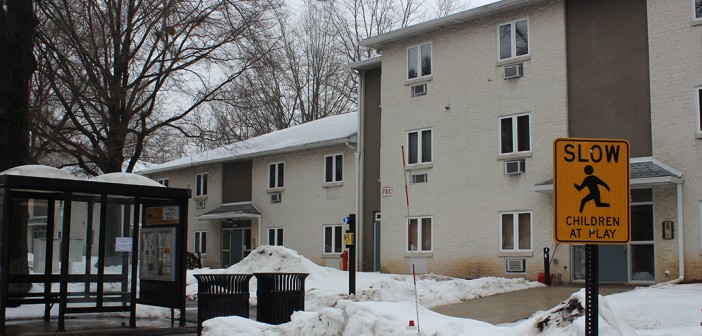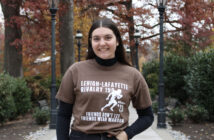Graduate students comprise nearly a third of Lehigh’s student population. Despite their prevalence on campus as teaching assistants, researchers, students and volunteers, many graduate students network mainly with other graduate students in their own departments.
Katie Fisher came to Lehigh’s biological sciences integrative program in the fall having already gotten her master’s degree and taught as an adjunct professor at another university.
“We don’t do too much outside the department,” Fisher said. “We are all great friends and colleagues, which makes an atmosphere that is friendly but conducive to work.”
Mike McLaughlin, another researcher and TA in the biology department, shares Fisher’s opinion of the camaraderie in their department.
“Time is the most valuable currency for grad students,” he said.
Because graduate students are held to a higher professional standard, many graduate students see Lehigh as their employer and focus on work rather than social involvement.
“As an undergrad, it’s about the ‘college experience,’ whereas in grad school, it’s ‘How am I going to get a job once I have my Ph.D.?’” McLaughlin said. “It’s good to have fun but you have to have that mentality.”
While some graduate students cite their limited social network as a function of their extremely busy schedules, others say there is an unwritten social code among some circles of graduates not to befriend undergraduates.
Like McLaughlin and Fisher, Corey Greenwald is a first-year graduate student in Lehigh’s biology department. Unlike his peers, however, Greenwald went straight from his undergraduate institution to Lehigh, without taking any time off. He said, possibly because he was the youngest in his department, that he almost felt prohibited from making the natural friendships with undergraduates that are close to him in age.
“I see both sides of it,” said Greenwald. “(Lehigh’s) paying me to be a research assistant and do a certain level of work. I understand that they ask me to act like a professional. They’re also giving me a lot of restrictions on who I can be friends with. It’s like an unspoken rule that people just follow.”
Rory Siegel, ’17, who is taught by a graduate student for his biology lab, said that he did not think anyone would have a negative reaction to hanging out with graduate students.
“I just think it doesn’t happen,” Siegel said. “I can’t imagine any graduate student wanting to hang out in Lehigh’s off-campus scene. It doesn’t seem like their thing.”
Josh Tonkay, a graduate student in the English department, said that many of his colleagues view graduate school as work. For them, a healthy separation between work and home life is desirable.
“Socializing is different,” Tonkay said. “A lot of people are either in serious relationships or married, and a good chunk have kids. We don’t live on campus, and those activities are designed for people with immediate access.”
While age differences and geographical division deter many graduate students from Lehigh’s traditional off-campus social scene, some graduate students see no reason to avoid friendship with undergraduates.
For instance, students who graduate from Lehigh but stay for graduate school can retain their social networks from the undergraduate experience and thus avoid encountering the social boundaries that limit some graduate students. Mark Mahoney, for example, stayed at Lehigh for his to receive his master’s degree after graduating last spring. He said that socializing has not changed much for him as a graduate student.
“In some ways I like the new friends I’m making because they’re on the same page I am,” Mahoney said. “But I kept my old friends who go to Lehigh.”
Other students who did not go to Lehigh as undergraduates said that being involved on campus allowed them to have more comprehensive social networks.
Salman Raza, who is in his second year of Lehigh’s MBA program, said he worked for six years before coming to Lehigh and is somewhat older than many of his peers. Nonetheless, Raza said his campus involvement has allowed him to make friends with a variety of graduate and undergraduate students.
“Friendship comes to me as something that relates to the natural bond between people,” Salman said. “It’s not something that should be given by age, ethnicity or professional status. When you find it with a person, I don’t think anything else matters more than mutual interest.”
Raza, who is also treasurer of the Graduate Student Senate, demonstrates the unity that the Senate tries to promote among graduate students in different departments as well as undergraduates.
“One of my aims was to get involved with undergraduate’s activities and make a campus-wide event,” said Nipun Goel, the president of Graduate Student Senate.
For the past few years, the Senate has worked hand-in-hand with the undergraduate Student Senate to put on events such as the Gatsby Gala this past February. Goel said that it becomes easier to interact with undergraduates when you talk and interact with them as you would with anyone else.
On the same note, Joe Brague, the Graduate Student Senate historian and graduate student adviser for the Neuroscience Club, said that his involvement on campus made it easier to interact with undergraduates.
“To erase that stigma, you just need respect,” Brague said. “The only difference is another few years’ education.”






Comment policy
Comments posted to The Brown and White website are reviewed by a moderator before being approved. Incendiary speech or harassing language, including comments targeted at individuals, may be deemed unacceptable and not published. Spam and other soliciting will also be declined.
The Brown and White also reserves the right to not publish entirely anonymous comments.